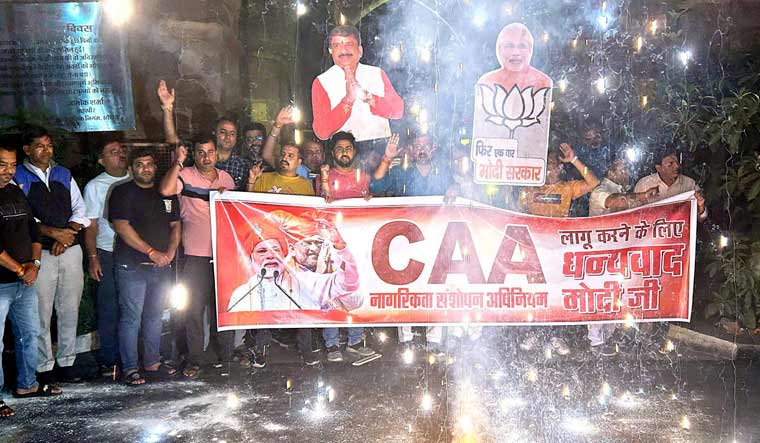"I hereby declare that my intention is to make India as permanent home…." Persons belonging to the minority community from Afghanistan, Bangladesh and Pakistan, namely Hindu, Sikhs, Buddhists, Jains, Parsis and Christians, who want to become Indian citizens can undertake this declaration under the Citizenship (Amendment) Rules, 2024, notified by the Union Home Ministry on Monday night.
The purpose is to give Indian citizenship to refugees who sought shelter in the country before December 31, 2014, due to religious persecution in the three countries. Among the many undertakings, there is also the condition to renounce their old citizenship permanently. It says, “...that the citizenship of my country shall stand renounced irrevocably in the event of my application being approved and that I shall not raise any claim on it in future."
As floodgates open for the persecuted minorities from these three countries who will be signing the undertakings under the Citizenship (Amendment) Rules, 2024 in the coming days and months, the Union Home Ministry has explained the procedures to be followed for applying for Indian citizenship under section 6B of Citizenship (Amendment) Act, 2019 by registration or naturalisation, under six categories—-the applicant is a person of Indian origin; the person is married to an Indian citizen; the applicant is a minor child of a person who is a citizen of India; applicant is a person whose parents are registered as citizens of India; a person who or either of his parents was a citizen of Independent India or the applicant is a registered Overseas Citizen of India Cardholder.
The Union Home Ministry’s notification runs into hundreds of pages, elaborately explaining the procedures, to ensure there are no discrepancies or misuse even as it opens doors for persecuted minorities to enter the country, not just for shelter or protection, but as citizens.
Union Home Ministry sources said the Citizenship (Amendment) Act, 2019, removes legal barriers to rehabilitation and citizenship and gives a dignified life to refugees who have suffered for decades. They said the citizenship rights will protect their cultural, linguistic, and social identity. It will also ensure economic, commercial, free movement and property purchase rights.
Union Home Minister Amit Shah said Prime Minister Narendra Modi has "realised the promise of the makers of makers of our Constitution" by notifying the implementation of the CAA.
The MHA notification said that the citizenship applications will be submitted online to the Empowered Committee, to be set up in States and Union Territories, headed by the Director (Census Operations) of the State or Union Territory and consisting of four officers- an officer in the Subsidiary Intelligence Bureau not below the rank of Deputy Secretary to the central government; jurisdictional Foreigners Regional Registration Officer; the State Informatics Officer of National Informatics Centre of the State or Union Territory and the Post Master General of the State or Union Territory or a Postal Officer nominated by the Post Master General, not below the rank of Deputy Secretary to the government.
A second layer of invitees to the Empowered Committee will be from the districts like the District Informatics Officer, representatives from the Office of District Collector and Principal Secretary (Home) who will verify the applications and applicants and administer the oath of allegiance before forwarding it online to the Empowered Committee.
"The Empowered Committee on being satisfied with the suitability of the applicant, may grant him the citizenship of India by registration or naturalisation, as the case may be, and issue a certificate of registration or naturalisation," says the rules.
The chairman of the Empowered Committee will maintain an online register of details of all registered or naturalised citizens which will be available to the Union Home Ministry and security agencies. Affidavits, certificates of allegiance, addresses, photographs, marriage and birth certificates, residential permit, foreign passports and all such crucial documents will be shared by the applicants.
In cases where the applicant is a national of Afghanistan, Bangladesh or Pakistan, their foreign passports or Residential Permit issued by the Foreigners Regional Registration Officer (FRRO), educational certificate issued by the schools or colleges in the three countries or land or tenancy records in Afghanistan, Bangladesh or Pakistan will need to be shared. Such applicants can also show any document to prove that either of the parents grandparents or great-grandparents was a citizen of either of the three countries.
Government sources said there have been many misconceptions about the Citizenship Amendment Act, which is a law to give citizenship, and not take away citizenship of any Indian citizen, irrespective of religion.
The aim is to give shelter to those who have suffered persecution for years and have no other shelter in the world except India, said government officials. "The Constitution of India grants us the right to provide religious persecuted refugees with fundamental rights and to grant citizenship from a humanitarian perspective," they said.
The BJP government had promised the implementation of CAA in its 2019 Lok Sabha election manifesto as a major step towards protecting persecuted religious minorities from neighbouring countries.



